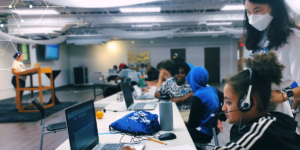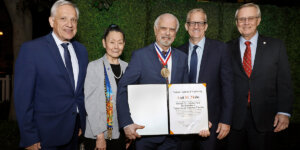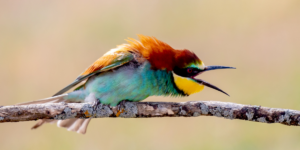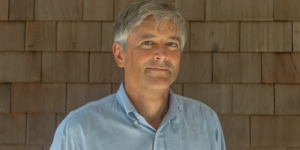
Professor Maja Mataric with daughter Amelia, sees a future in which robots and humans learn together using mixed reality. (Photo/Hugh Kretschmer)
Professor Maja Matarić, a renowned computer scientist and roboticist at the USC Viterbi School of Engineering, has been elected to the American Academy of Arts & Sciences, a prestigious honor recognizing excellence in academia, the arts, industry, policy, research and science.
She joins 269 new members in the 2023 class, alongside James Van Cleve, professor of philosophy at the USC Dornsife College of Letters, Arts and Sciences.
This year’s new members include such luminaries as Emmanuelle Charpentier, who won the 2020 Nobel Prize for developing the CRISPR gene editing technology and Lin-Manuel Miranda, the award-winning creator of “Hamilton” and “In the Heights.”
Matarić, the founding director of the USC Robotics and Autonomous Systems Center, is known for her groundbreaking work in the field of socially assistive robotics, where she designs robots that can interact with humans and provide assistance for those in need. Her research has been applied in various domains, including rehabilitation, education and eldercare.
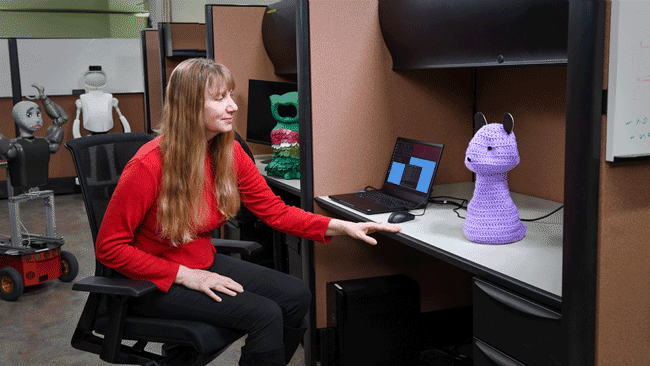
Professor Maja Matarić with Blossom, a cuddly, robot companion to help people with anxiety and depression practice breathing exercises and mindfulness.
“It’s an incredible honor to become part of such an interdisciplinary group of past and current members of the oldest U.S. academy!” said Matarić. “I feel a bit stunned and truly humbled. The diversity of the academy’s membership especially resonates with me: I share the passion of bringing disparate perspectives and ideas together toward novel solutions to long-standing individual and societal challenges. By being invited to the group, I feel welcomed into a new richly interdisciplinary community.”
As the Chan Soon-Shiong Chair in Computer Science, Neuroscience, and Pediatrics at USC, Matarić has worked at the intersection of multiple fields. Pioneering the study of socially assistive robotics, or “robots that care,” the field combines robotics, artificial intelligence, and human-centered design to develop robots that can help people with physical or cognitive disabilities. The field has inspired investments from federal funding agencies and technology startups. The assistive robotics market is estimated to reach $25.16 billion by 2028.
Her work has been recognized with numerous awards and honors, including a Presidential Award for Excellence in Science, Mathematics, and Engineering Mentoring from President Barack Obama.
Founded in 1780, the Academy has elected members such as George Washington, Benjamin Franklin, and Albert Einstein, as well as more recent inductees like former President Obama, author Ta-Nehisi Coates, and actor Tom Hanks. Previous USC Viterbi inductees include: Len Adleman, Scott Fraser, John Brooks Slaughter, Sol Golomb, C.L. Max Nikias, Steven Sample, Tony Maxworthy, Richard Bellman and Robert Hellwarth.
According to the Academy, the new class was selected based on their achievements in their respective fields and their contributions to society.
Matarić’s work has been featured in numerous publications, including The New York Times, Time magazine, and Wired. She is also the author of a book published by MIT Press, “The Robotics Primer,” which serves as a comprehensive guide to the field of robotics.
In addition to her research, Matarić has been a passionate advocate for increasing the diversity and representation of women and underrepresented minorities in STEM fields. She has mentored numerous students and has served on committees and boards promoting diversity and inclusion in academia and industry.
Published on April 19th, 2023
Last updated on January 11th, 2024





